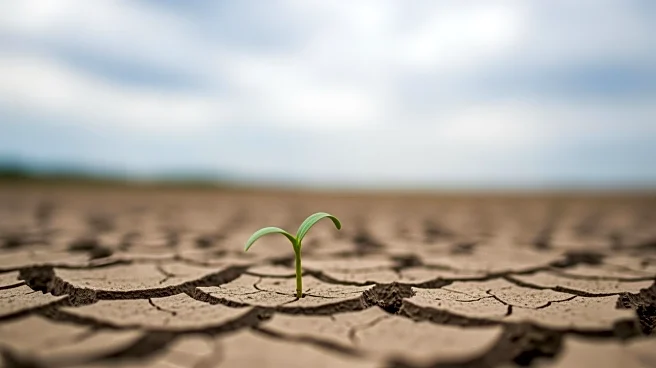What's Happening?
A group of South Korean farmers has filed a lawsuit against the state utility Korea Electric Power Corporation (KEPCO) and its subsidiaries, alleging that their reliance on coal and fossil fuels has exacerbated climate change, leading to crop damage.
The farmers, including Hwang Seong-yeol, claim that erratic weather patterns linked to climate change have severely affected their agricultural yields. This lawsuit, the first of its kind in South Korea, seeks to hold KEPCO accountable for its role in climate change and the resulting agricultural losses. The plaintiffs are demanding compensation for their losses and are urging the government to phase out coal power plants by 2035.
Why It's Important?
The lawsuit highlights the growing concern among farmers about the impact of climate change on agriculture, a sector inherently vulnerable to weather fluctuations. It underscores the challenges South Korea faces in transitioning to cleaner energy sources, as the country remains heavily reliant on coal. The case could set a precedent for holding power companies accountable for their contributions to climate change. It also draws attention to the need for South Korea to accelerate its shift towards renewable energy, which is crucial for its economic ambitions in sectors like semiconductors and artificial intelligence.
What's Next?
The lawsuit seeks initial damage claims and symbolic compensation to push for a faster transition to renewable energy. KEPCO has acknowledged its responsibility to reduce carbon emissions but faces financial constraints due to accumulated debt. The outcome of the lawsuit could influence South Korea's energy policies and its approach to climate change mitigation. Experts suggest that deregulating solar investments and expanding offshore wind sources could be part of the solution.
Beyond the Headlines
The case raises broader questions about the ethical responsibility of power companies in contributing to climate change and the economic implications for farmers. It also highlights the need for systemic changes in energy policy to ensure sustainable agricultural practices and economic stability. The slow transition to renewable energy could impact South Korea's competitiveness in global markets, particularly in technology sectors.

















